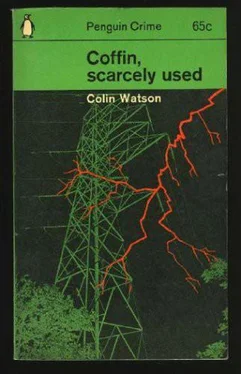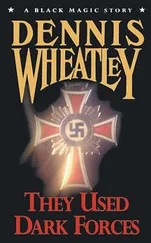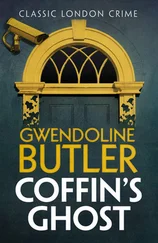“We should be glad to have your help, sir...”
Mr Smith inclined his head and continued to register delight. “Anything we can do, we shall be only too pleased.”
“...in a somewhat delicate matter,” Purbright added, and the tiniest flake of frost settled upon Mr Smith’s manner.
“You will have heard of the death last Monday night of Mr Marcus Gwill?”
“Indeed, yes. A shocking affair. A gentleman and a most charming man.”
“You found him so, sir?”
“Oh, yes.” A slight pause. “Within the limits of our professional relationship, of course. What was, er, your impression, inspector?”
“If I had formed one, it would scarcely be relevant to my present inquiries, sir.”
“Quite so.” Mr Smith nodded and gave the first of the tiny, flicked glances at the clock above Purbright’s head that were to accompany his every second remark throughout the interview.
“But the general impression conveyed to me by others is that Mr Gwill was not outstandingly easy to get along with.”
“I can quite understand that, inspector, now that you mention it. He was reserved, you know, and perhaps just the least bit forbidding. Charm was not his strong suit.”
“What I have to ask you, Mr Smith, is not so much concerned with the gentleman’s character as with his cash. He dealt predominantly with this bank, I understand.”
“I see no harm in confirming that he did have a private account with us.” Mr Smith’s eye was now more watchful within its smiling socket.
“Small or large?”
“Of late, quite substantial. And it was about to become much more substantial, as you no doubt know already.”
“I don’t, as it happens, sir. I wonder if you’d care to tell me about that?”
“Ah...” Mr Smith had realized his indiscretion. “I think perhaps you should not press me in these somewhat confidential matters, inspector. A client’s affairs are with us—what shall I say?—like the secrets of the confessional.”
“But not, surely, after he’s been murdered, Mr Smith?”
“Murdered?” The manager succeeded in looking as if Purbright had suddenly asked for an overdraft.
“Oh, yes. So now he’s my client as well, in a sense.”
“I see...But how dreadful.”
“This is news to you?”
“But decidedly. I had no idea.”
“Except for rumours, perhaps?”
Mr Smith shrugged delicately. “We make it our business not to pay too much attention to rumour, inspector. The bank likes to be absolutely sure of everything.”
“So do the police, sir. That is why I have presumed to trespass upon your time.”
Mr Smith nodded sagaciously and joined his fingertips. “Please ask me anything you like, inspector. It is the duty of us all to cooperate in the solution of crime, especially”—his smile returned and resumed its seat, as it were, upon the smooth cushions of his face—“especially when the victim is a person of integrity.”
“And recently augmented substance,” Purbright put in, suggestively.
“Ah, yes. I was about to elaborate on that theme, was I not? Well, the addition to Mr Gwill’s fortunes, such as they were, was to have been brought about under the terms of the will, of course.”
“The will?”
“Yes. The late Councillor Carobleat’s bequest. A matter of”—Mr Smith rolled his eyes upward for a moment—“oh, some eighteen thousand pounds.”
Purbright frowned. “But surely he left a widow?”
“Ah, the widow. Yes.” Mr Smith picked an invisible thread from his cuff. “A peculiar circumstance, that. But the will was quite explicitly in Mr Gwill’s favour—and in that of certain other beneficiaries. Mrs Carobleat has not suffered as much as you might think, however.”
“Insurance?”
“Er, so I am led to understand. A substantial sum. Then there was the house, and so forth. She is well provided for.”
“That was my impression,” said Purbright. “Even so, it isn’t customary to will away all one’s money over a wife’s head, so to speak.”
“Quite so. It came as a surprise to me, I admit. I had expected Carobleat to be found to have died intestate, as a matter of fact. It was only a short time before his illness that the question of wills cropped up in conversation between us. He gave me to understand that he had taken no steps in that direction. Naturally, I urged upon him the desirability of making proper provision, but he gave no sign of taking me seriously. Yet the will must already have been in existence at that very time, although it didn’t actually come to light for some little while after his death.”
“And how was that?”
“I’m not sure that I ought to tell you, inspector.” Mr Smith regarded his finger-ends as though his professional conscience pulsed there, just below the skin that had flicked back without temptation the corners of untold thousands of banknotes. “You might think that someone had been a little remiss, although I’m sure it was simply a matter of a slight lapse in office routine. Not all firms are run as punctilliously as banks, you know.”
“The will was mislaid?”
Mr Smith leaned forward. “Strictly between ourselves,” he said, “it was. Gloss explained afterwards how it had happened. Well, of course, he had to be absolutely frank about it, because of the possibility of its being challenged by the widow. She didn’t, as it happens, but never mind.”
He remained silent for some time.
“Well?” Purbright prompted.
“Well what?” countered Mr Smith.
“The will,” said Purbright. “You were saying how it came to be mislaid.”
“Ah...I can’t say that I remember precisely. It was quite a silly, simple sort of reason—put in the wrong deed box, or something like that. But it came to light eventually. The money hasn’t been turned over yet, by the way. Executing a will takes quite a while. But it was definitely on the turn, if you follow me. How galling it must be to die just too soon to enjoy a legacy that you know is practically in your hand—in your account, rather.” Mr Smith shook his head and closed his eyes in brief mourning for Mr Gwill’s ravished opportunities.
“Gwill’s account was separate, I suppose, from the finances of his newspaper company?”
“Oh, yes, naturally.”
“And would you say that his income as shown by the private account was consistent with the earnings he received from the company?”
Mr Smith looked sharply at the inspector. “No,” he replied simply, “I should not.”
“He was receiving money from another source?”
“Almost certainly he was. Not that it was any concern of mine, of course, but these little impressions register, you know, in spite of ourselves.”
“Yes, don’t they. Incidentally, have you retained any impression of what that source was, sir?”
“None whatever.”
“Because the money was deposited in cash?”
Mr Smith flexed his facial muscles in a smile. “There are, as they say, no flies on you, inspector.”
Purbright acknowledged the compliment with a grunt. He had concluded by now that Mr Smith was not merely fly-proof but probably impervious to attack and courtship alike by all creatures whatsoever.
“You have been most helpful, sir,” he said, rising.
The manager, though not appearing to move, was suddenly transposed to the door of his office, which he flung open while extending his free hand in an ushering gesture of brotherly dismissal. “Not at all, inspector. Delighted.” In the instant before turning back to his desk, he darted a glance at the three counter clerks and gave an inward click of satisfaction on noting that the entire trio was immersed in work.
Chapter Twelve
If Alderman Leadbitter had been less preoccupied with wholesale meat deals, bottles of pale ale, and a certain matter that had filled him with secret excitement since his rising that morning shortly before eight o’clock, he could not have failed to be conscious of a radiant pink orb that had hung in the background all that day. As it was, Sergeant Love’s face had been a mere blurred iridescence amongst the other unnoticed details of his surroundings.
Читать дальше












